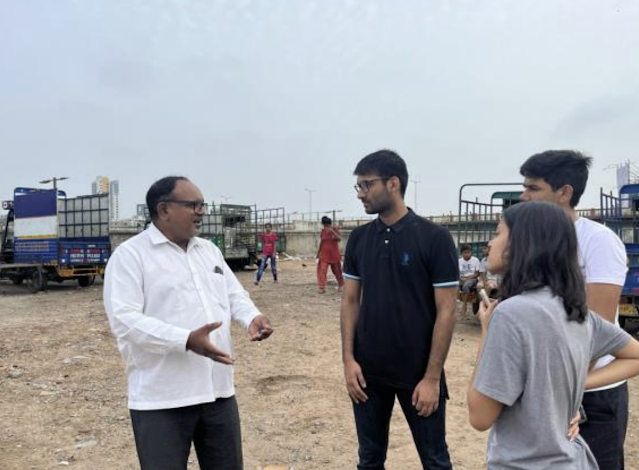By Rachit Gupta*
During a field visit to Shankar Bhawan in Shahpur, Ahmedabad, I was appalled by the dire conditions faced by impoverished residents. They were compelled to defecate in the open due to the absence of a proper sewage system and lack of water supply in the community washrooms. These purported washroom facilities seemed more like breeding grounds for diseases than conveniences for the residents.
As my fellow group members and I were on-site, we noticed curious stares from the locals. Presumably, our appearance marked us as outsiders. After about 10 minutes of interaction, a resident approached us, sharing their plight and urging us to document the situation. They suggested that we approach the commissioner to seek a resolution. While we had not explicitly revealed our purpose, our attire likely signaled that we were visitors evaluating the situation.
The hope in their eyes left me numb. Their lack of basic facilities, like running water, was evident. The person in charge of the washrooms illicitly collected money for maintenance, yet neglect persisted, despite a monthly government payment of Rs. 25,000.
During a field visit to Shankar Bhawan in Shahpur, Ahmedabad, I was appalled by the dire conditions faced by impoverished residents. They were compelled to defecate in the open due to the absence of a proper sewage system and lack of water supply in the community washrooms. These purported washroom facilities seemed more like breeding grounds for diseases than conveniences for the residents.
As my fellow group members and I were on-site, we noticed curious stares from the locals. Presumably, our appearance marked us as outsiders. After about 10 minutes of interaction, a resident approached us, sharing their plight and urging us to document the situation. They suggested that we approach the commissioner to seek a resolution. While we had not explicitly revealed our purpose, our attire likely signaled that we were visitors evaluating the situation.
The hope in their eyes left me numb. Their lack of basic facilities, like running water, was evident. The person in charge of the washrooms illicitly collected money for maintenance, yet neglect persisted, despite a monthly government payment of Rs. 25,000.
 |
| The wall that divides privileged and underprivileged |
Their hope underscored their dire need for support. Sadly, the government, meant to uplift them, exploits. Efforts focus on concealing flaws from outsiders, not bettering lives.
A poignant example of this was the construction of a concealing wall that shielded the area from the view of passersby on the riverfront. This attempt to create an illusion transformed the city into the purported "Manchester of India," camouflaging the underlying challenges faced by the people residing in this neglected community.Another testament to the fact that social movements commence with a group of individuals who foster hope for effecting change and enhancing society is my encounter with social activist Parsottam Vaghela. He is a dedicated social worker affiliated with the Janvikas Association, Vastrapur, and he has been tirelessly combating open defecation and manual scavenging for 10+ years.
Upon meeting him, I was deeply inspired by the unwavering optimism and hope evident in his words and actions. He showed a genuine belief that positive transformation is imminent and that the conditions for these marginalized communities will indeed improve.
For those affected, hope serves as a means of coping. Envisioning a more promising future, they nurture resilience and uphold their motivation to confront exploitation. In summary, my experience and learnings have taught me that hope is a catalyst for driving change, forming the foundation of most social movements.
---
*PGP Batch of 2022-24, Indian Institute of Management, Ahmedabad
Upon meeting him, I was deeply inspired by the unwavering optimism and hope evident in his words and actions. He showed a genuine belief that positive transformation is imminent and that the conditions for these marginalized communities will indeed improve.
 |
| Parsottam Vaghela with IIM-A students |
---
*PGP Batch of 2022-24, Indian Institute of Management, Ahmedabad


Comments